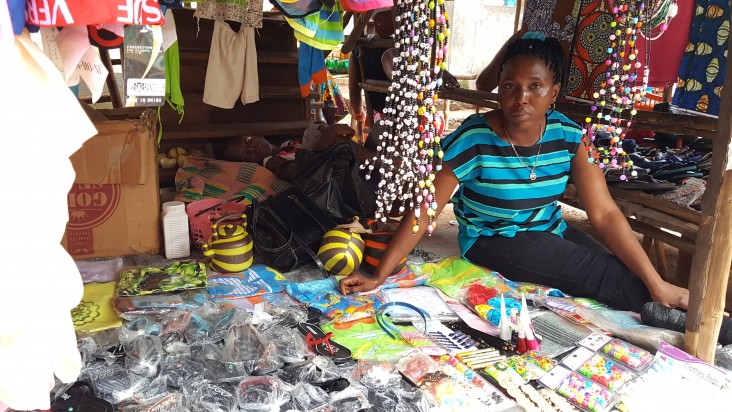Speeches Shim

February 2018—Wanday Bangura’s stall in a bustling market in the Bombali district of northern Sierra Leone is full of shoes, jewelry, scarves and other products displayed for sale. Her small enterprise is flourishing.
“We have money to eat … and buy market items to sell. So we tell God thanks,” she explained.
Bangura’s business was not always thriving. During the Ebola epidemic, which contributed to approximately 4,000 deaths in the country between 2014 and 2016, Sierra Leoneans faced significant restrictions on their movements and public gatherings, put in place to curb the spread of the disease.
These restrictions hindered Bangura’s ability to bring her goods to market and sell them to customers in her shop. As a shopkeeper, she relied on contact with the public to generate income, and her business suffered greatly.
Finally, to feed her family of seven, Bangura had to sell off or barter away her inventory. By the end of the outbreak, her supplies and resources were completely exhausted, and she had nothing left to invest in her shop. The epidemic was over, but Bangura faced a long road to recovery.
However, support from the American people has helped Bangura and similarly struggling Sierra Leoneans pull themselves up and get back on their feet.
In 2017, Bangura received three cash transfers through an emergency food security program funded by USAID’s Office of Food for Peace and implemented by ACDI/VOCA, an NGO. She also participated in the program’s household economics training, building her ability to manage her finances and prioritize expenses.
The cash transfers not only allowed her to purchase the nutritious foods her family required, but also helped her respond to other needs, including kick-starting her livelihood and reestablishing her shop, which is now profitable and sustainable.
Bangura is not alone. Between 2015 and 2017, emergency cash transfers delivered by five of USAID’s NGO partners in Sierra Leone reached approximately 360,000 vulnerable people. Many participants also benefited from a range of complementary activities, including education in nutrition and hygiene that enhanced dietary practices and health; the distribution of vouchers to purchase seeds that increased crop production and income generation; and the formation of village savings and loans associations that strengthened social bonds and allowed communities to grow their collective cash reserves.
This flexible, market-based food assistance did much more than improve access to nutritious food. It also spurred the recovery of markets, livelihoods and communities in the region.
Today, Bangura’s shop is prospering as the threat of Ebola wanes. But she has not forgotten that the American people were there to support vulnerable Sierra Leonean communities when they needed help.
“We tell you thanks, the people of America,” she said. “You have really tried for us. We pray that God blesses you.”
LINKS
Follow @USAIDFFP, @USAIDWestAfrica, on Facebook

Comment
Make a general inquiry or suggest an improvement.